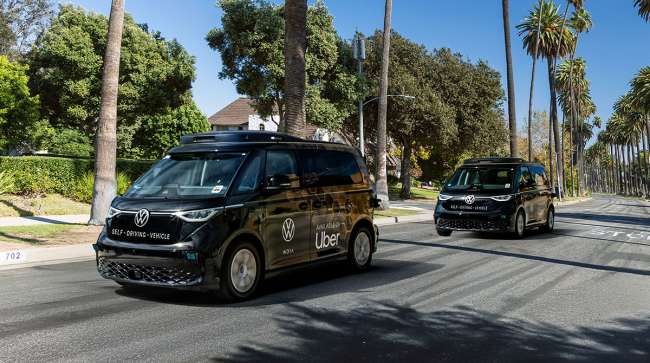Road testing begins later this year. (Uber/Business Wire)
Uber Technologies Inc. and Volkswagen AG have partnered to deploy thousands of electric ID Buzz vans in the U.S., marking the latest partnership to expand autonomous options on the ride-hailing app.
The companies will begin testing the vans on roads later this year and plan a commercial launch next year in Los Angeles, they said in a statement April 24. During initial testing, a human operator will be inside the vehicles. The launch will take place in stages and only proceed following necessary regulatory approvals. The partnership is planned to expand to other major U.S. markets over the next decade.
Driverless cars have been an area of increasing focus for Uber, which has opted to team up with manufacturers and fleet managers after abandoning efforts to develop its own in-house solution. That’s an idea the company invested heavily in years earlier. One of its most high-profile partnerships is with Waymo in the U.S., with self-driving rides now offered in Phoenix and expanding to Atlanta soon.
So far, Uber has struck deals with more than a dozen global partners to deploy self-driving technology across its ride share, delivery and freight businesses. This comes as the market is set to expand: Tesla Inc.’s human-supervised robotaxis are coming to Austin, while Waymo has been quickly growing its fleet in major cities.
Volkswagen has been testing its ID Buzz vans with human operators in Austin. Those vehicles are outfitted with autonomous driving software made by Intel Corp. spinoff Mobileye Global Inc. For deployment of the vehicles on the Uber platform, Volkswagen is using a system developed by its MOIA brand.
Elsewhere in the U.S., Uber plans to work with Avride to offer autonomous rides on U.S.-made Hyundai Ioniq 5s in Dallas this year. Outside the country, it’s offering autonomous rides in Abu Dhabi and Dubai with China’s WeRide Inc.
Rival Lyft Inc. has also said it plans to offer its first autonomous rides in Atlanta with Toyota Motor Corp.-backed startup May Mobility “as soon as this summer.”






